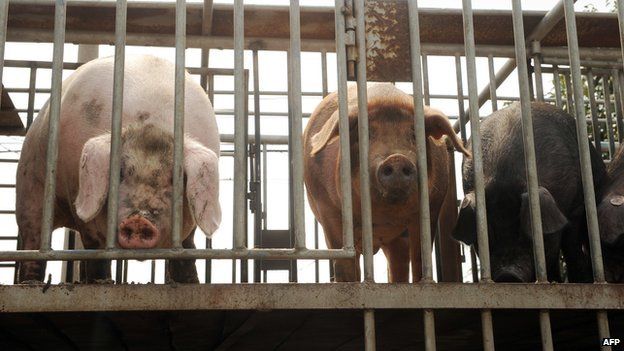Concerns grow over farm drugs used like 'sweets'
- Published

The widespread use of antibiotics on farms without medical supervision has been condemned at a meeting of the World Organisation for Animal Health (OIE).
There are particular concerns about the US where authorities say it contributes significantly to resistance.
There are also worries that a new US-EU trade deal will see a watering down of tougher European laws on their use.
The OIE says it has tried to broker a compromise between the two regions.
But so far this has been unsuccessful.
It's estimated that 80% of the antibiotics purchased in the US are used on farm animals.
The drugs are given as prophylactics to livestock to help them avoid illnesses that are transmitted easily between beasts confined in large-scale feed lots.
The drugs are also used to boost the animal's weight.
But the large-scale use has prompted concerns that microbes will develop resistance.
These toughened bugs are a threat to humans as well as animals.
Recent reports suggest a strong link between the overuse of antibiotics in animals and infections in humans.
Late last year the US Centers for Disease Control, said that drug resistant infections were causing 23,000 deaths every year.
Part of the problem in the US is that often the antibiotics are administered by producers or farmers, without medical supervision.
A survey by the Department of Agriculture found that less than half of dairy farmers followed a vet's recommendations on using antibiotics.
Speaking at its annual congress in Paris, the head of the OIE condemned these practices.
"Antibiotics must be used by people with appropriate training on the risk," Dr Bernard Vallat told BBC News.
"If they are circulating like... food or sweets, it can be an at-risk practice."
In Europe, the drugs on farms are more tightly controlled and their use as a growth aid is banned.
Concerns have also been raised about the current negotiations between the US and EU over the Transatlantic Trade and Investment Partnership (TTIP).
The aim of these talks is to reduce or remove trade barriers to boost economic activity between the EU and US.
While the EU says that its consumer, health and environmental protection regulations are "not negotiable", trade campaigners are worried that a deal will see compromises - especially in the area of animal medicine.
"It is very clear in terms of industry interests on both sides of the Atlantic, that they are interested in removing barriers to trade and antibiotics are one of those key areas," said Shefali Sharma from the Institute for Agriculture and Trade Policy.
"They are going to agree to a framework where industry is at the table and the framework is going to be what is least restrictive on trade."
"That is what is really problematic about having food safety standards being part of that equation."
The OIE said it has already attempted to build a consensus on this issue - so far without success.
"The risk analysis about the use of antibiotics is different between the EU and North America," said Dr Vallat.
"OIE tried to propose a compromise on the prudent use of the drugs in animals but those compromises must be democratically adopted by our members."
Concern over the direction of these trade talks is higher on mainland Europe, especially Germany, according to Shefali Sharma.
"This is a big issue, every day you are seeing new constituencies waking up and saying we don't like the fact that there are a whole range of standards being discussed behind closed doors that implicate every public concern that we might think about," she said.
The scale of the threat from both human and animal was underlined at this meeting by the director-general of the World Health Organization (WHO), Dr Margaret Chan, who warned that the world was headed to a "post-biotic" era.
"If you need a hip replacement, if you need a stent in your heart vessels, no surgeon will operate on you. No one will provide treatment to cancer patients without coverage of antibiotics," she said.
"I am not saying human health is more important than animal health, my message is that we are very closely linked in this entire ecosystem."
In the UK, concerns have been raised that government funding cutbacks are hampering attempts to detect antibiotic resistance on farms.
Last week a group of leading researchers, writing in the journal Nature, called for the establishment of an independent global body to deal with the problem.
Follow Matt on Twitter..
- Published9 May 2014
- Published8 May 2014
- Published23 May 2014